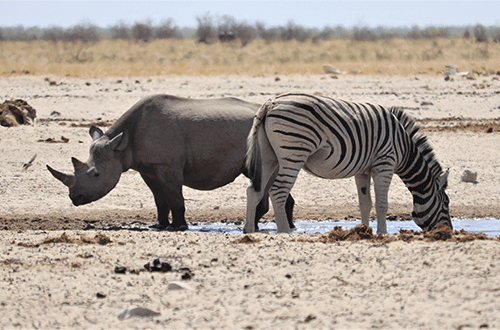ETOSHA – Namibia strengthened its anti-poaching drive by launching two rhino preservation plans and a horse patrol unit at the country’s Etosha National Park on Friday.
Speaking at the commemoration of World Rhino Day, which falls on 22 September every year, Minister of Environment, Forestry and Tourism Pohamba Shifeta said the day is dedicated to raising awareness of the threats facing the rhino population, and how the world can come together to protect these endangered species.
The event was attended by officials from the Ministry of Environment, Forestry and Tourism (MEFT), the Namibian Defence Force, the Namibian Police Force, representatives from the Save the Rhino Trust and the World Wildlife Fund, as well as people from conservancies.
“Illegal hunting for rhino horn is primarily responsible for the crash in the black rhino population in Africa from perhaps 100 000 in the 1960s to a low of about 2 410 in 1995. Through strict conservation programmes, the numbers in Africa have since increased, reaching 5 081 by the end of 2012,” Shifeta said.
The minister noted that the rhino preservation plans will serve as a tool to help conserve and sustainably manage a growing free-ranging population of both black and white rhinos in Namibia.
The use of horses in the conservation and protection of rhinos will thus help with mounted patrols, and cover more distances.
“Thirteen horses have been purchased by the MEFT, with funding support from the Game Products Trust Fund. Eight horses will have their duty station in the Etosha National Park, while five will be stationed in the Waterberg Plateau Park,” he added.
Shifeta said Namibia is still experiencing illegal rhino hunting, and the illegal trade in rhino horns. This year, 39 rhinos were poached in the country, compared to 92 in 2022, 50 in 2021, 47 in 2020 and 61 in 2019.
– Nampa/Xinhua


